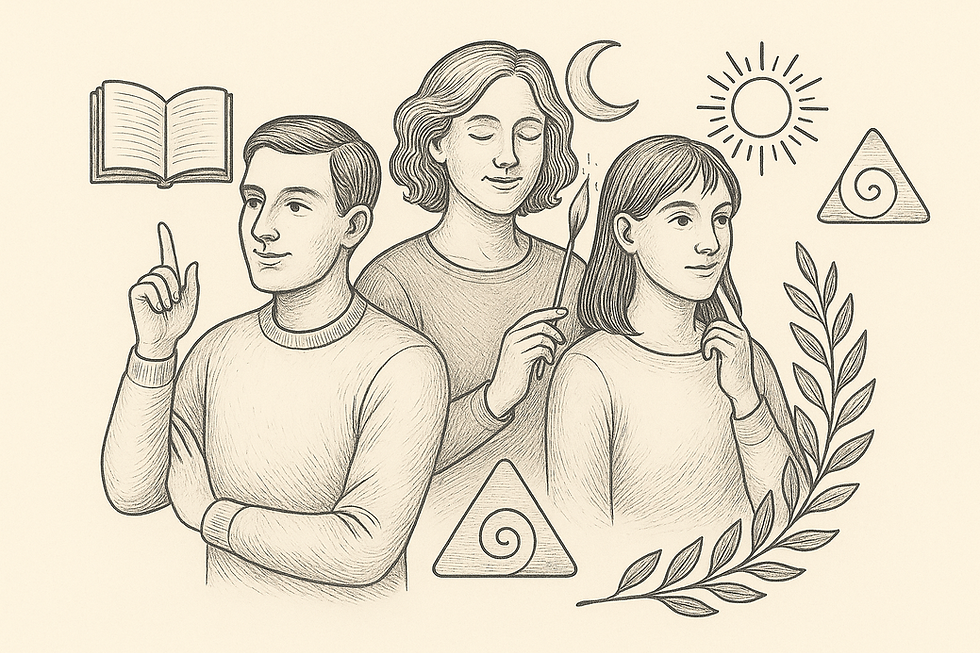Do Names Shape Us? I'm launching Alice's Wonderlab!
- alicepailhes

- May 19, 2025
- 3 min read
I’ve often wondered whether being named Alice had something to do with how I turned out. Not just the curious child asking endless “why”s, but the adult who built a career around perception, illusion, and the invisible forces that shape our minds. After all, Alice was the one who fell through the rabbit hole. Who questioned logic. Who met impossible characters. Who changed size, changed shape, and never stopped asking what was real.
I read the story when I was little — and then re-read, and re-imagined.I didn’t just share a name with the girl who wandered into Wonderland.In some ways, I think I became her.

🪞Can a name really shape who we are?
Psychologists think it might — at least in subtle, surprising ways. Research on something called implicit egotism suggests that we’re unconsciously drawn to things that reflect parts of ourselves, especially our names.
People named Dennis are overrepresented among dentists, and people named Laura are slightly more likely to live in Louisiana. It sounds silly, until you realize how many of our choices are nudged by familiarity and self-identity without us ever knowing.
Take the birthdate–number effect: people tend to prefer numbers that appear in their birthdate. Even lab participants are more likely to feel positively about someone whose participant number resembles their own birth date.
Or the name-letter effect: a subconscious preference for things that mirror who we (think we) are. Across cultures, people consistently prefer the letters that appear in their own names. We even tend to marry others whose first or last names resemble our own.
So is it really that surprising that I, Alice, ended up chasing wonder for a living?
I’ve spent years studying how magic and psychology intersect. How our minds can deceive us — but also enchant us. I’m writing a book now about those invisible forces. And as I write it, I keep thinking about that other Alice — the one who fell through the looking glass and discovered that the world is far stranger, and more malleable, than it first appears.
Maybe I’ve been trying to build a Wonderland of my own all along, a place where science and mystery can sit at the same tea table.
So… I finally am.
✨ I’m launching something new: Alice’s Wonderlab — a playful online lab where you can take part in fun psychological experiments and discover fascinating insights about how our minds really work.
If you’re curious, you can sign up for my newsletter at the bottom of this page — I’ll share the experiments as they launch, and send you the results as we explore them together.
🔍 The first experiment is live! Want in? 👉 Click here
Let’s fall down that rabbit hole together.
#Wonderland #EverydayMagic #Identity #Psychology #Storytelling #ScienceCommunication #NameLetterEffect #Curiosity #Alice #AlicesWonderlab
Scientific references:
Pelham, B. W., Carvallo, M., & Jones, J. T. (2005). Implicit egotism. Current Directions in Psychological Science, 14(2), 106-110.
Koole, S. L., Dijksterhuis, A., & Van Knippenberg, A. D. (2001). What's in a name: implicit self-esteem and the automatic self. Journal of personality and social psychology, 80(4), 669.
Jones, J. T., Pelham, B. W., Mirenberg, M. C., & Hetts, J. J. (2002). Name letter preferences are not merely mere exposure: Implicit egotism as self-regulation. Journal of Experimental Social Psychology, 38(2), 170-177.
Pelham, B. W., Mirenberg, M. C., & Jones, J. T. (2002). Why Susie sells seashells by the seashore: implicit egotism and major life decisions. Journal of personality and social psychology, 82(4), 469.



Comments